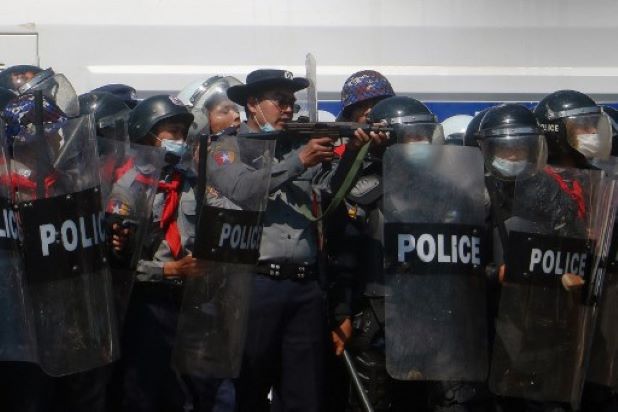
STR / AFP
(AFP) — The United Nations on Monday condemned Myanmar for its increased use of force against protestors, after police fired rubber bullets and tear gas at anti-coup demonstrators defying a military ban on rallies.
Protests erupted for a fourth straight day against last week’s coup to oust civilian leader Aung San Suu Kyi, as international condemnation of the putsch grew.
The rallies came despite a warning from the junta that it would take action against demonstrations that threatened “stability”, and a new ban on gatherings of more than five people.
In Naypyidaw, the remote capital purpose-built by the previous military regime, witnesses said police fired rubber bullets at protesters after earlier blasting them with water cannon.
“They fired warning shots to the sky two times, then they fired (at protesters) with rubber bullets,” a resident told AFP.
It remains unclear how many people were hurt, as a hospital in Naypyidaw would not allow relatives to see their family members, said Tun Wai, who rushed there when he heard his 23-year-old son was in the operation room.
“My son was shot when he tried to use the megaphone to ask people to protest peacefully after the police used water cannon to disperse them,” the 56-year-old goldsmith told AFP.
“He got hit in the back… I’m very worried about him.”
In Mandalay, the country’s second-biggest city, police fired tear gas to disperse protesters.
A witness, who declined to be named out of fear of the authorities, said she gave safe shelter to about 20 of the tear gassed protesters, offering them water, towel and fresh face masks.
By nightfall, the United Nations expressed “strong concern” over reports of numerous people being injured by security forces on Tuesday.
“The use of disproportionate force against demonstrators is unacceptable,” said Ola Almgren, the UN resident coordinator and humanitarian coordinator in Myanmar.
After watching hundreds of thousands of people rally in opposition to last week’s coup, junta chief General Min Aung Hlaing made a televised speech Monday evening to justify seizing power.
The first of a series of bans on gatherings in protest hotspots was also announced on Monday, as was a nighttime curfew.
But on Tuesday, fresh protests emerged in various parts of Yangon, including near the headquarters of Suu Kyi’s National League for Democracy (NLD).
The protesters carried placards some of which read “We want our leader”, in reference to Suu Kyi — who is currently detained by the military — and “No dictatorship”.
By afternoon, thousands had gathered in neighbouring Kamayut township, carrying umbrellas and wearing raincoats as they faced off against police, who had water cannon trucks blocking protesters from marching ahead.
“Of course we are worried (about a crackdown),” said protester Khin Thida Nyein, a teacher. “We only have one life but we still come out…. as we are more concerned for the future of our children.”
Protesters dispersed by nightfall, with no reports of clashes with Yangon authorities.
– Military promises –
In a televised address Wednesday, his first since the coup, Min Aung Hlaing insisted the seizure of power was justified, citing the fraud claims.
The NLD won last November’s national elections by a landslide but the military never accepted the legitimacy of the vote.
Shortly after the coup, the military announced a one-year state of emergency and promised to hold fresh elections after that.
Min Aung Hlaing on Monday insisted the military would abide by its promises and reinstall democracy. He also declared that things would be different from the army’s previous 49-year reign, which ended in 2011.
“After the tasks of the emergency period are completed, free and fair multi-party general elections will be held according to the constitution,” he said.
But those pledges were accompanied by threats.
In the face of the increasingly bold wave of defiance, the military warned that opposition to the junta was unlawful.
In a statement read on state media, it said “action must be taken” against activities that threaten stability and public order.
– Global outrage –
New Zealand on Tuesday became the first foreign government to take concrete public action, announcing the suspension of high-level military and political contacts with Myanmar.
The United States has led global calls for the generals to relinquish power, and issued a fresh statement on Monday following the junta’s warnings against the protesters.
“We stand with the people of Burma and support their right to assemble peacefully, including to protest peacefully in support of the democratically elected government,” US State Department spokesman Ned Price said Monday, using Myanmar’s former name.
Price also said US requests to speak to Suu Kyi had been denied.
Pope Francis on Monday called for the prompt release of imprisoned political leaders.
The UN Human Rights Council said it would hold a relatively rare special session on Friday to discuss the crisis.
Meanwhile, relatives of an Australian economic advisor to Suu Kyi said they were “distraught” over his detention.
Macquarie University professor Sean Turnell was the first foreign national confirmed arrested by the new junta.
Australian Foreign Minister Marise Payne has summoned the Myanmar ambassador over the case.
© Agence France-Presse
